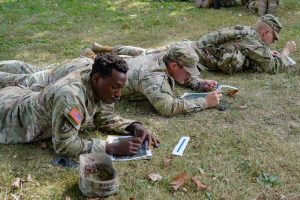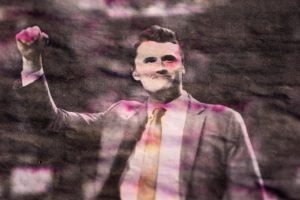Worth 1,000 words
January 17, 2001
Sports Editor
Walt Owens keeps a stack of pictures in his desk. Not just of his family, like his son, Mel, who played football for the St. Louis Rams and now works for the XFL.
“It was nice watching my son turn pro,” he said.
Nor is the stack limited to students he has taught or coached, such as Mary Wilson of the Supremes or former Detroit Tigers baseball star Willie Horton.
“We had a great array of players come through, but that was expected,” Owens, now an assistant NIU kineseology and physical education professor, said of his inner-city Detroit high school. “Once the kids won, they expected that second win. The kids believed it.”
By personal invitation, Owens attended last summer’s dedication to Horton at Tiger Stadium. In Horton’s honor, a statue was built. The next picture.
“He did a lot,” Owens said of Horton’s playing career. “He had some great numbers. Willie (Horton) made a tremendous contribution to Detroit, especially during the riots they had. He went down to Tiger Stadium, put on his uniform and walked the streets.”
The former coach continues to flip through the stack. A group of Negro League Players inducted into the Baseball Hall of Fame with him over the summer appears next. Owens, who played in the Negro League from 1953-56, was given a golden watch.
“I thought I had it rough, but those other guys, they had it rough,” Owens said of his Negro League days. Even with the change in times from two separate leagues, Owens still felt some of the effects of mid-20th century racist America. After high school, he attended Western Michigan University.
“I couldn’t play basketball because they didn’t have another black roommate,” Owens said. “I kept waiting for my chance to play baseball, but it never came. The first time up, I hit a double down the left-field line. The second time I came up, the coach said, ‘Hey, what are you doing?'”
Owens had taken the opposite side of the plate as a switch hitter, but the coach told him they didn’t play switch hitting there. So the left-handed hitter returned to the right side and lined the ball down the left-field side again.
While at WMU, Owens would travel back to Detroit to play on weekends. After WMU, he continued to play in recreation leagues and on club baseball teams, one of which was even run by the Mafia.
“We went into this house and we were gambling in the house,” a teammate recalled to him during a reunion. “And they put you out.”
Owens wasn’t allowed inside because he was a licensed schoolteacher and if the police were to raid the house, he would have lost his license. So, in an attempt to help him win some money, mob members staged a race for a Detroit city block, then waged on who would win the race, giving Owens his rightful percentage after he won.
Considering he still holds a track record at Western Michigan, it isn’t really surprising that he won that day. But for every sprint and hit on the diamond, his heart still was in hardwood floors.
“I thought I had a shot at playing basketball,” Owens said. “So, I would play under assumed names. You couldn’t play two sports at that time. But I never got an opportunity to play.”
Owens did, however, shoot hoops for the Harlem Globetrotters organization. He was with the Boston Whirlwinds, a team that faced the legendary unit.
Owens flips further through the stack on his desk.
Former Chicago Cubs Ryne Sandburg and Billy Williams pop up. NBA players like Karl Malone follow. He then flashes past a picture of former NIU basketball coach Brian Hammel. NFL star Jerome Bettis is next up.
Then come photos of some of his former students.
They haven’t all benefited strictly though Owens’ athletics teachings. One student told him that when he was stationed in Vietnam during the war, he would sing the school song Owens made him learn.
“That’s how we stayed alive,” he told him. “We had faith in one another.”
NIU Judicial Office director Larry Bolles, a close friend of Owens, said he sees the impact he makes on NIU every day.
“He’s a treasure we have here at Northern,” Bolles said. “Everybody is good and bad, but he only sees the good. He doesn’t see any bad students. That’s what separates him from most people. We have a slogan now: Students first. It’s always been that way with Walt.”
Bolles and Owens met when Owens would accompany students in the Judicial Office, making a case for the students he had sitting in front of him. From that alone, Bolles said, he knew Owens was something special.
“He’s a person who believes in Northern,” Bolles said. “He believes in NIU as a place to be. I’ve seen him take kids to the airport or pick them up and drive them home to Chicago. He always has kids calling from all over America just to say hi.”
“‘The kid thought about me and gave me a call,” Bolles recalled Owens telling him. “‘It’s a kid I had in class 10 years ago.’ Anybody can help an ‘A’ student. He can’t save everybody, but he’s saved a whole lot.”
Bolles shared stories of how Owens has walked students to the Financial Aid Office or given them a “pep talk” when they told him how they wanted to give up on school.
And they remember. Former students invite him to weddings or celebrations just to thank him for what he has done for them. While at a hotel convention in Reno, Nev., Owens once ran into Wilson. The Supremes were having a concert at the same hotel.
“She called me at 1 a.m.,” Owens said. “‘Coach, what are you doing? Are you going to the show?'”
Owens attended the following evening to hear the group sing, and Wilson addressed the audience.
“‘I understand one of my high school teachers is here. Are you out there, Coach?'” she asked.
She then called Owens onto the stage during the concert. He went, camera in hand.
“He makes every invite,” Bolles said. “He goes and he takes pictures.”






